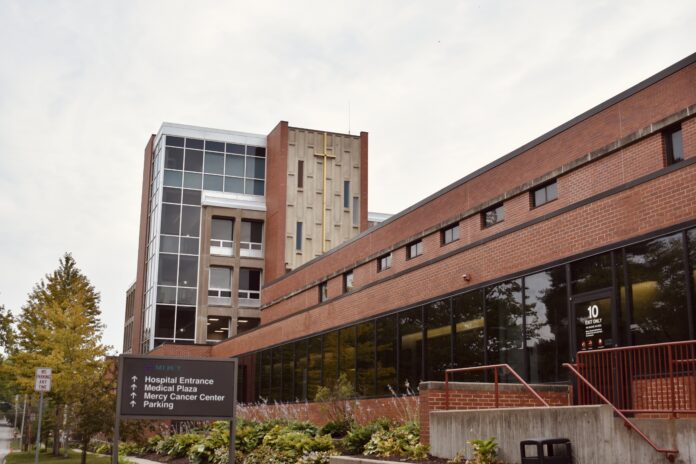
A federal bankruptcy trustee has objected to plans by the University of Iowa to fast-track its planned $20 million purchase of Mercy Hospital-Iowa City.
Faced with the possibility of involuntary receivership, Mercy filed for bankruptcy earlier this month and, at the same time, announced plans for its acquisition by the University of Iowa.
The Iowa Board of Regents approved the plan, which stipulates that the university will submit an initial bid of no less than $20 million to acquire Mercy – although the final purchase price could be higher if there are competing bids.
Now, however, the federal bankruptcy trustee is objecting to the speed and manner in which the proposed sale is being handled. Trustee Mary R. Jensen has formally objected to proposed orders approving the bidding procedures and authorizing the hospital to provide certain financial protections to the university as the stalking horse bidder.
A stalking horse bid is an initial bid on the assets of a bankrupt company and is agreed upon in advance as a way of establishing a minimum sale price. Typically, a stalking horse bidder is afforded various incentives, such as actual-expense reimbursement or a “breakup fee” that’s paid out if another prospective buyer submits the winning bid.
In filing with the court, Mercy’s bankruptcy trustee argues that adequate time has not been allotted for other prospective buyers to submit a bid by the Sept. 19 deadline, undermining efforts to obtain the highest purchase offer for the hospital.
“That deadline does not appear to provide sufficient time for other interested bidders to conduct their due diligence and submit a competitive bid,” the trustee has told the court. The trustee also cites the current lack of any evidence of the hospital being marketed to potential buyers, which is a necessary step to justify a shortened timeframe for a sale.
The trustee also argues the various protections given to the university as part of the deal could discourage competing bids. Plans for the proposed sale state that to be deemed “qualified,” a bid must be for no less than $21.3 million – an amount that’s equal to the university’s original $20 million bid amount, plus $100,000, plus a 4% breakup fee, plus $400,000 for the university’s expenses.
As a result, any qualified competing bid for Mercy must be at least 6.5% higher the university’s initial bid.
That requirement, the trustee argues, “threatens to chill competitive bids without any offsetting benefit” to Mercy and its creditors, noting that the various fees to be paid to the university “results in a potential payout to the university of $1.2 million if they are not the prevailing bidder at auction.”
An unsuccessful stalking horse bidder such as the university may seek reimbursement for actual expenses, or it may seek a 4% fee to compensate for its risks and expenses, but in this case the university would collect both, the trustee states.
Purchase contemplated for 10 months
Although the proposed purchase by the university contemplates a sale being approved by late September — a tight deadline given the Aug. 9 announcement of the sale — it has been under consideration for at least 10 months.
The proposed purchase agreement references a separate nondisclosure agreement dated Nov. 1, 2022, that bars either Mercy or the university – a public institution — from making “any public announcement related to the transaction” without the agreement of the other party.
The bankruptcy and sale were triggered by Preston Hollow Community Capital, a specialty finance company that claimed in late July that Mercy was in “a financial freefall.” As one of Mercy’s biggest creditors, Preston Hollow went to court last month and asked a judge to appoint a receiver who could take control of the hospital’s assets. Preston Hollow claimed the 234-bed, acute care hospital was incurring “unsustainable financial losses” and argued that a receiver was needed to avoid a shutdown of the hospital.
Mercy has sought to have that case dismissed, calling Preston Hollow’s actions a “pretextual power play by an investment fund that puts the medical team, employees, patients and larger community at risk.”
According to Preston Hollow’s petition, Mercy’s liquidity has declined by $40 million, or 51%, over the past nine months and the hospital has a negative cash flow of roughly $2.6 million per month.
The hospital’s own financial projections show that its liquidity will dwindle to less than $5 million – a level that’s insufficient to pay the cost of ongoing operations – by late September, the petition alleges.
“If action is not taken immediately, the hospital may be forced to cease operations and shutter,” the petition states, adding that Preston Hollow has implored the board to initiate a financial turnaround plan “before it falls off the financial cliff” in September.
Tax records show that the hospital finished the 2022 fiscal year $16.8 million in the red, taking in $177 million while spending almost $194 million. That was a dramatic shift from the previous year, when the hospital took in $10.4 million more than it spent.
According to those same records, the hospital’s net assets or fund balances dropped precipitously over that same period, from $96.8 million in 2021 to $55.8 million in 2022.
This story was originally published by the Iowa Capital Dispatch. Reprinted with permission.




